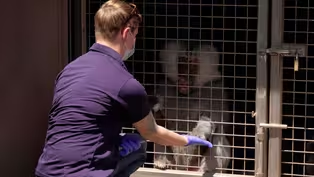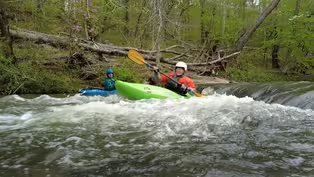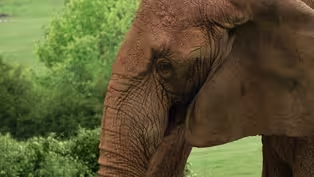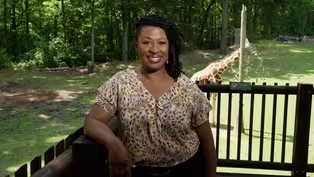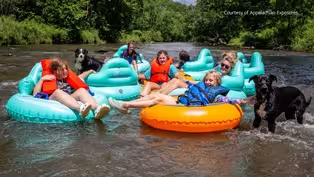
Summer's Coming!
Season 21 Episode 23 | 26m 46sVideo has Closed Captions
Get ready for summer with a visit to the NC Zoo. Also: paddling and glamping recs.
Get ready for summer with a visit to the NC Zoo in Asheboro. Also: paddling and glamping recommendations.
Problems playing video? | Closed Captioning Feedback
Problems playing video? | Closed Captioning Feedback
North Carolina Weekend is a local public television program presented by PBS NC

Summer's Coming!
Season 21 Episode 23 | 26m 46sVideo has Closed Captions
Get ready for summer with a visit to the NC Zoo in Asheboro. Also: paddling and glamping recommendations.
Problems playing video? | Closed Captioning Feedback
How to Watch North Carolina Weekend
North Carolina Weekend is available to stream on pbs.org and the free PBS App, available on iPhone, Apple TV, Android TV, Android smartphones, Amazon Fire TV, Amazon Fire Tablet, Roku, Samsung Smart TV, and Vizio.
Providing Support for PBS.org
Learn Moreabout PBS online sponsorship[piano intro] - Next on "North Carolina Weekend," join us from the North Carolina Zoo as we welcome summer.
We'll preview the Appalachian Summer Festival in Boone, go paddling on the Mayo, and enjoy the cabin life at Springmaid Mountain.
Coming up next.
- [Announcer] Funding for "North Carolina Weekend" is provided in part by Visit NC, dedicated to highlighting our state's natural scenic beauty, unique history, and diverse cultural attractions.
From the Blue Ridge and the Great Smoky Mountains across the Piedmont to 300 miles of barrier-island beaches, you're invited to experience all the adventure and charm our state has to offer.
[upbeat music] [upbeat music continues] [upbeat music continues] - Welcome to "North Carolina Weekend," everyone.
I'm Deborah Holt Noel, and this week we are welcoming summer all around our state.
I'm at the North Carolina Zoo in Asheboro, and it's a very special time here at the zoo.
2024 marks its 50th birthday, and the zoo is celebrating this event with activities all year long.
We'll explore the zoo more throughout the show.
But first, let's head to the campus of Appalachian State University in Boone, where another very special birthday is coming up, the 40th anniversary of the Appalachian Summer Festival.
[upbeat music] - Wow.
Trying to describe Appalachian Summer Fest is exciting because it's a little bit of everything.
- So an Appalachian Summer Festival is a summer celebration of the arts.
It's multidisciplinary.
- Great artists, great arts, great university.
That's what energizes me is seeing people engaged, jumping up and yelling after the end of a great concert.
Spend a few days in the high country, enjoy the cooler weather.
It's always cooler no matter how hot it is, and enjoy a range of things that can really expose you to some great art.
- My parents were the ones that actually started this festival.
Appalachian Summer Festival started in the early 80s when my father Arnold Rosen he met with the chancellor and vice chancellor and suggested maybe we had more culture going on in the summer, bring the community into the university.
- An Appalachian Summer is part of the longstanding tradition of Appalachian State University's mission for access.
We were founded in 1899 to provide access to what they called the Lost Provinces.
They needed educational opportunities for the folks who lived here in the mountains.
The arts are part of that access as well.
- It was very important to the founders of this festival that the entertainment be accessible.
- This is the 20th year for our art museum, the Turchin Center.
The opening of that the first year with everybody coming in, and wow, we have this here in Boone and the great concerts here.
- [Wright] The indoor venues are world class.
We've had several performers over the years that have commented on how spectacular the sound is in the Schaefer Center.
- We also love the idea of doing a large outdoor concert, even though the weather is always a challenge.
- [Hank] The high country is known for rain and thunderstorms in the summer, a little big town, it was 45 or an hour and 15 minutes we had to wait because of lightning.
And then, you know, when the show started, it was great.
- What a show!
- [Denise] We have film, we have dance, and we have theater too.
So there's a little bit of something for everybody.
- [Hank] We had Darius Rucker, and over the years we've had lots of outside artists.
- Everything from the Beach Boys to Willie Nelson, having the Doobie Brothers and Chicago, wow, probably 10, 11 years ago.
Theatrical performers, we had Leslie Odom Jr., Lea Salonga.
- We're able to present a series that features award-winning films from around the world, many of which are not available in theaters or even online.
And as well as our visual arts programming, outdoor sculpture is a real part of the festival.
- My aunt and uncle were responsible for starting an outdoor sculpture competition here.
It's a juried competition.
The students get to enjoy the art as well as the community.
- [Wright] I personally think what makes this festival so unique is it appeals to a wide range of audiences.
It appeals to a wide range of age groups.
- If you're doing chamber music one night and then you have Keb' Mo' the next night, and then you have Dance Theatre of Harlem.
Each of those nights, each of those performances attracted a different audience.
And we just love it when we look around the lobby, and we see that the audience is very, very different from night to night, which, of course, is what we hope to do with the festival.
We pride ourselves in knowing that the same artists that appear at an Appalachian Summer Festival are probably appearing in other venues across the country.
We're able to offer those same artists at much lower prices because we do so much fundraising from our philanthropic community that also shares our mission and our belief in the importance of access.
- Thank you for supporting all of these artists.
We'd also like to thank all of you.
We have some dedicated people here that value the arts, value this program, and support it with their money so that other people can enjoy it.
- The best of the best that you would typically have to go to a very large city to experience.
- I would love to see this festival go another 40 years.
I don't think my parents ever thought it would last this long, but it's grown and we're really proud of it.
- To have a festival that has that kind of longevity and has continued to grow and prosper and get better every single year gives me comfort that it will be around for hopefully another 40 years.
- This mountain is gonna be home for the visual arts and performing arts, film, dance, music for many, many years to come.
And that it's gonna be part of who we are as a university, part of who we are as a community.
[upbeat music] - [Deborah] An Appalachian Summer Festival kicks off June 29th with a performance by Natalie Merchant and wraps up on July 27th with a show by Brad Paisley.
And, of course, there are events that entire month all over Appalachian State University campus.
To find out more, visit their website at appsummer.org.
I'm here with Diane Villa, the Chief Communications director at the North Carolina Zoo.
Diane, congratulations on 50 years of being one of the world's premier zoos.
- Oh, thank you so much, Deb.
We are so excited to have you here at the North Carolina Zoo and show off our beautiful zoo.
- Well, you know, I love this place.
Tell me what you think have been some of the major accomplishments over the last 50 years.
- Well, I think the most important one was the original vision for the North Carolina Zoo, and you see that in action here right now.
So we are the world's largest natural habitat zoo, and that was the vision that the founders had for the North Carolina Zoo.
So we are now 2,800 acres, 500 of which are developed, and we're growing.
- Now, how many visitors would you say come through here on a daily basis?
- On a daily basis through the week, we have around 5-6,000.
On the weekends, this past April, we had as many as over 14,000 on a Saturday.
So last year we had over a million guests come to the zoo, and we're expected to grow to 1.5 million with the opening of Asia in 2026.
- [Deborah] That is so exciting.
I can't wait to see that opening.
- Oh, it's gonna be fantastic.
It's already 82% complete from the contractor side.
And over the next year or so, our staff will get into the Asia habitat, and we'll be planting and theming and putting up educational graphics and introducing the all important animals.
- I just love seeing the gazelle and the antelope out here.
What's the role of conservation out here at the zoo?
- Conservation is incredibly important to us here at the zoo.
It's in our DNA.
And, again, talking about the founding of the zoo, we always wanted to have that wildlife conservation element to what we do no matter where we are.
So in Africa, we have African vulture programs.
African vultures are the steepest declining bird in the world right now.
So that's critically important that we work with them.
We help those animals.
African elephants, of course, you know, we've been working in Cameroon and Kotdwar for many, many years working on elephant poaching.
Our smart program spatial monitoring and reporting tool is used in over 120 countries, over 1200 sites around the world, every continent except the Antarctic.
That's incredible because it really is making a difference for the animals in the wild.
Here in North Carolina, we work with the American Red Wolf, the most endangered canid in the world, and only found here in North Carolina, in the eastern part of North Carolina.
We breed them here in the hopes of returning them back to the wild.
We work with hellbenders in the mountains of North Carolina.
We work with gopher frogs.
So these are all species that are around you that are important to the circle of life, and that's what we do.
We do that best.
Our team is boots on the ground out there trying to do the work for all the citizens of North Carolina.
- When I talk to people about the zoo, one of the things they love is the natural setting.
Why is that so important here?
- It really sets the North Carolina Zoo apart from most other zoos.
So many zoos are city zoos, and they would fit inside of this one habitat here that we're looking at, 40 acres for the animals of the grasslands.
That's phenomenal.
But why do people want to be out in nature?
Why are people seeking that?
I think it's something that's so important for human beings to be a healthy person being out in nature.
There's something about the greenery and seeing wildlife and as we hear now, all the cicadas that have descended on us.
But, no, we connect people quite well to nature here at the North Carolina Zoo.
- [Deborah] And the animals love it.
- [Diane] They do.
- [Deborah] They need it.
- [Diane] They absolutely do.
We pride ourselves on our large habitats to give them the room to display their natural behaviors.
And, again, when people come out, they see that.
And when they look out across these habitats, you see greenery, you see trees, you don't see city skyscrapers.
And that resonates with people.
They want to be outside in nature and in the natural world.
- Indeed.
Diane, tell me about the visitor experience.
- When you come to the North Carolina Zoo, you're going to be greeted with famous southern hospitality.
So we have got lots of fun experiences.
We get people out on habitats on safari, and you can actually go in with the rhinos.
You can get up in the trees with air hike and do a like a challenge course for yourself.
- [Deborah] I bet the kids love that.
- [Diane] Kids love that.
Teenagers.
- [Deborah] Even the older kids.
- [Diane] Yes, they do.
Kids of all ages.
We have the carousel, which is perfect for littles to ride an endangered animal on that wonderful carousel ride.
We also have a kaleidoscope butterfly garden with exotic, gorgeous butterflies from all over the world.
- [Deborah] Sounds fun.
- Yeah.
Yeah.
There's so much more to do here than just see the animals.
It's a full day experience, and it's really quite affordable.
- And people need to wear their sneakers.
- Yes.
- Because you will do some walking out here at the North Carolina Zoo.
- We guarantee two things.
One, you're gonna get your steps in, your 10,000 steps.
And two, your kids are gonna drop like flies on the way home.
- [Deborah] So plan to stay the day.
- Plan to stay the day.
Absolutely.
- [Deborah] The North Carolina Zoo is at 4401 Zoo Parkway in Asheboro, and they're open every day from 9:00 AM to 5:00 PM.
Plan your visit by giving them a call at [336] 879-9000, or go online to nczoo.org.
Our state is blessed with all kinds of water environments for paddlers to enjoy.
So whether you like to paddle the slow waters down east or whitewater in the mountains, the Carolina Canoe Club is a leader in mapping these waters.
Let's join them on a trip along the Mayo River.
[twangy music] [twangy music continues] [twangy music continues] - The north fork of the Mayo is just a delight for people that live in the Triad.
It's not that far from Greensboro and Winston.
This is a great river for beginning boaters that have control of their craft, paddlers be they kayaks or canoes or sea boats.
It's about 3.5 miles, and it has a lot of fun little ledges.
Just smile as are going down there.
Mayo is my home river, I would say.
We've been paddling this stretch right now for about 20 years.
2025 will be our 20th year of having a trip here.
- This river offers all skill levels.
You can do different sections that are flat moving that would be better for beginners.
And then you can do intermediate spots like the ledges above the Boiling Hole.
And then for the thrill seekers, the adrenaline junkies, they can hit the Boiling Hole and play and, you know, do S-turn and practice their skills.
So it provides a little bit of everything for everybody.
[upbeat music] - I started the paddling the Mayo as a way of giving back to the community, and the way you do that is you lead trips.
So I started having them in the summer, and guess what?
Nobody came.
Everybody's got vacations and graduations and such.
So I thought, well, hey, what's everybody doing the third Saturday in January?
And the answer is not much.
The event grew from maybe 10 people the first year to 20 people, and then we're probably averaging 35 to 40 people.
Got all these people, but we're not doing anything.
So I thought food drive.
So we started doing food donations.
Stoneville has sort of adopted us.
We learned about Debbie's, Debbie's Biscuits.
So the first stop for anybody coming to the mighty Mayo should be a trip to Debbie's and get a biscuit.
And it's just been a great way to recreate in the community and show them that boaters are givers.
[upbeat music] - It's more than just keeping a clean river, making sure the river stays clean.
It's about that community, that tide that we have lost over the past couple hundred years that it can make us stronger in all ways.
Like, we can drive our economy, it can bring neighbors together.
Swimming, fishing, kayaking, boating in any sense of the form, it's more people to secure a future for our water long into the future.
[gentle music] - The first trip on the Mayo River taught me that you're responsible for your own results.
And I think it gave me confidence as a person, and it has taught me through my life that, you know, you see a challenge and you meet it.
You learn from others.
I think the boating world has introduced me to wonderful people that have influenced my life in ways I can't even imagine.
[gentle music] - [Deborah] Mayo River State Park is in Rockingham County, and it has several access points.
For more information, visit the park website at ncparks.gov.
And for more information about the Carolina Canoe Club, visit their website at carolinacanoeclub.org.
[upbeat music] - Hi, Sandy.
Good.
Here's your bite Can I see your hand?
Good.
- Your hand?
Good, good, good.
Good job.
Good.
- Oh, that's good.
- Shannon, Kamisha, what were you doing with the baboons?
- We were doing some medical training for them, so it's really important for us to keep their body part presentations up to date and check their teeth, practice voluntary hand injection with them for all their vaccines and things like that.
Yeah.
- So what's the exercise?
What do you have them to do and what do they do in return?
- So we will ask them for their behaviors, like Kamisha just mentioned, and once they complete that behavior in the appropriate way, we will reinforce them with some fruit to either some apple or banana.
- What are some of the presentations?
Like, I saw you put your hand up, and then Babu put his hand on your hand.
- Yeah.
It's kind of like they mirror our hands.
So we ask for hand, they put, like you said, their hand up.
We do foot, we have different cues, so different things that we, you know, for foot, it's this, for hand it's just hand.
For butt, it's this.
- So how long does it take to teach them these behaviors, Shannon?
- So it kind of depends on the individual.
Some animals are really, really fast learners, whereas other ones take a little bit of time, but typically in between a couple of days to a couple of weeks.
- What kind of baboon is this, and what's unique about this species?
- So these are hamadryas baboons, and what is very unique about them is their social system.
Most primates live with just one male and several females.
However, hamadryas baboons are unique because they can live with multiple males and multiple females at one time relatively peacefully.
And they're able to do that because each male has a harem of females, which is also called a one-male unit.
And the other males will respect the bonds that male has with all of his females.
- Well, they're a lot of fun to watch, and it's good to know that they have the open canopy also to explore.
Thank you so much.
This was a lot of fun.
- Yeah, no problem.
- Thank you.
- I just love visiting the giraffe deck here at the North Carolina Zoo.
It's a great way to get up close to these beautiful, magnificent creatures.
You know, to welcome summer in a very relaxing way, why not rent a cabin in the mountains?
We found the perfect spot near Spruce Pine.
It's called Springmaid Mountain, and it's the perfect vacation, rain or shine.
[upbeat music] - Waking up each morning, there's not a bad view from any window in the house.
Go to the kitchen, look out the window, I can see the horses down in the pasture, see the ducks on the pond, just see the earth waking up in the morning here.
That's a great feeling.
Sometimes, you see the fog coming up off the pond.
When it's snowing, it's quiet, and you see the snow coming down.
[gentle music] Springmaid Mountain is a 400-acre retreat here in Spruce Pine, North Carolina.
We're about a mile and a half off the Blue Ridge Parkway.
We're in between Asheville and Boone right here in the Blue Ridge Mountains.
[gentle music continues] So I started as a temporary trail guide just to get me through to the spring, and here I am 17 years later still here.
What brings people to Springmaid Mountain, I think is the peace, the quiet, the coziness of the cabins, just getting away from the hustle and bustle of everyday city life.
But one of the fun things here on the property is the Swinging Bridge.
Kids love to get on it, jump on it, get it swinging.
Here on site, we have horseback riding.
We have five ponds for fishing.
We have the North Toe River.
And the summertime, we have inner tubes where you can float down the river.
And we have hiking trails, horseshoe pits, cornhole boards.
The trail rides, you leave the barn area, you'll go up some of the trails and then you'll cross the North Toe river a couple of times, which is always a highlight.
It's a great experience for any level of rider.
- Hey, welcome.
- Hey.
Nice to meet you.
- Yeah, you too.
All right, this is Starley.
- So this is my first time on a horse.
- Yeah.
- What are some things that I should know being a first time rider?
- Try to stay calm.
They can actually hear your heartbeat from four feet away.
So if you're really excited, they can feel that you're excited.
And when you get comfortable, you'll notice they'll all start breathing on the ride.
It's like a pfffft, pfffft, pfffft, and you're like, wow, that's a lot of breathing.
[upbeat music] So if I want Starley to go, I'm gonna point her head where I want her to go and give her a kiss.
[lip-smacking] The kiss is working very slowly.
Good girl.
You can always give him a pet, say, "Hey, thank you.
Good job."
Thanks.
Good job.
[upbeat music] [upbeat music continues] [upbeat music continues] She is just breathing.
It's totally a normal thing.
[upbeat music continues] - Is there anything else that I need to know before coming out here?
- We require that every participant shows up half an hour early for time to have the trip talk.
[upbeat music continues] - We have 16 different size cabins.
Our largest is our bunkhouse cabin, which will accommodate 40 people.
It has a commercial kitchen.
Everything in it is set up for a large group.
And then in the cabins go down inside.
We've got a five bedroom cabin that sleeps up to 12.
We got some three bedroom cabins that sleep six people.
And then we go down to two and one bedroom cabins.
Total, if we were completely full, every bed, we can sleep 120 people in here.
So this is our pavilion.
We host wedding receptions, birthday parties, family reunions.
On site, we also have a small campground that we can accommodate up to about a 30 foot travel trailer.
So we've got something forever budget.
Even on a rainy day like today, don't let that hinder you from visiting.
All the cabins have gas logs in there.
Great time to curl up with your favorite book.
Definitely a good time to visit year round.
- [Deborah] Springmaid Mountain Retreat and Stable is at 2171 Henredon Road in Spruce Pine.
To book your cabin or schedule a horseback ride, give them a call at [828] 765-2353 or visit them online at springmaidmountain.com.
Well, that's it for tonight's show and we have had a fantastic time out here at the North Carolina Zoo in Asheboro.
Hard to believe it's celebrating 50 years, and yet there's always something fresh and new.
Be sure to visit whenever you get a chance.
And if you've missed anything in tonight's show, remember you can always watch us again online at pbsnc.org, or you can find us on our YouTube channel.
Have a great "North Carolina Weekend" everyone.
[upbeat music] [upbeat music continues] [upbeat music continues] [upbeat music continues] [upbeat music continues] [upbeat music continues] - [Announcer] Funding for "North Carolina Weekend" is provided in part by Visit NC, dedicated to highlighting our state's natural scenic beauty, unique history, and diverse cultural attractions.
From the Blue Ridge and the Great Smoky Mountains across the Piedmont to 300 miles of barrier island beaches, you're invited to experience all the adventure and charm our state has to offer.
[upbeat jingle]
An Appalachian Summer Festival
Video has Closed Captions
Clip: S21 Ep23 | 5m 2s | An Appalachian Summer Festival in Boone celebrates 40 years of arts and music. (5m 2s)
Video has Closed Captions
Clip: S21 Ep23 | 2m 28s | Learn how animal keepers interact with baboons at the NC Zoo. (2m 28s)
Video has Closed Captions
Clip: S21 Ep23 | 4m 56s | Come along on a paddling adventure on the Mayo River with the Carolina Canoe Club. (4m 56s)
Video has Closed Captions
Clip: S21 Ep23 | 5m 57s | Enjoy a 50th birthday celebration for the North Carolina Zoo in Asheboro. (5m 57s)
Video has Closed Captions
Preview: S21 Ep23 | 38s | Get ready for summer with a visit to the NC Zoo. Also: paddling, glamping, and a Summerfest preview. (38s)
Video has Closed Captions
Clip: S21 Ep23 | 4m 59s | Springmaid Mountain offers cabin rentals, horseback riding and even tubing! (4m 59s)
Providing Support for PBS.org
Learn Moreabout PBS online sponsorshipSupport for PBS provided by:
North Carolina Weekend is a local public television program presented by PBS NC

